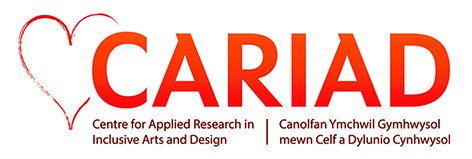The academic year 20/21 has challenged the CARIAD researchers to think about how we can introduce more inclusive ways for creative collaboration through the use of digital media and video conferencing.
With more organisations now open for collaborating remotely, we have been consulting with expert stakeholders in the care sector to consider how to improve levels of physical activity for older people, primarily in residential care settings.
Making Movement, funded by Cardiff Met Global Academies, has emerged through this collaboration. The project brings together an experienced multidisciplinary team of researchers from CARIAD and the Cardiff School of Sport and Health Sciences, led by Professor Diane Crone early career researchers, stakeholder organisations and representatives from patient groups. Our goal is to develop sensory enriched technologies that encourage people to move in meaningful and healthy ways. Although average life-span is ten years longer than for previous generations, these years are often lived in poor health (Centre for Ageing Better 2019). There is an urgent need to find ways to support people to ‘live well’ into older age. Research has evidenced the benefits of exercise and detrimental effect on health and wellbeing of loneliness and social isolation.
Over the course of 2021 we will be working on gathering data through creative activities that will help to refine the scope and goals of the research; provide clarity about the context for the study and its limitations; develop a network of potential organisations who can recruit participants who are ‘experts by experience’ (older people; people living with disability, dementia etc.) and scope potential pathways for impact and routes for dissemination.





